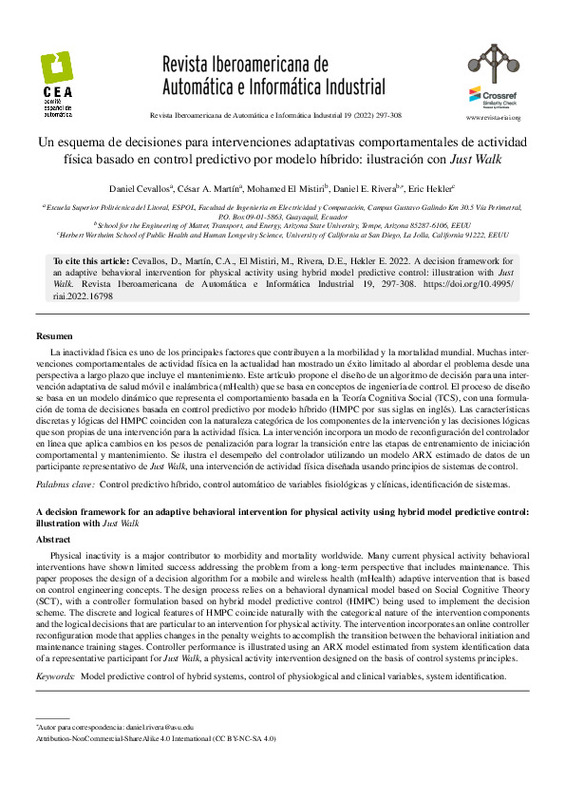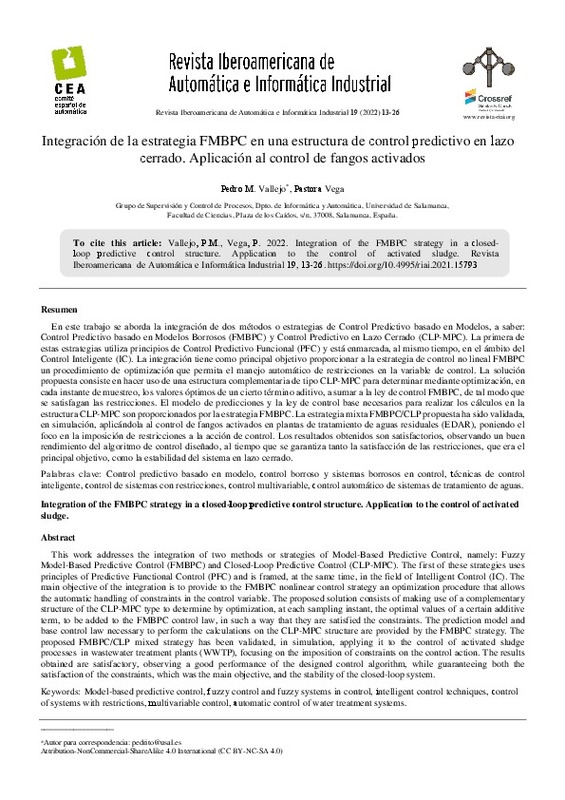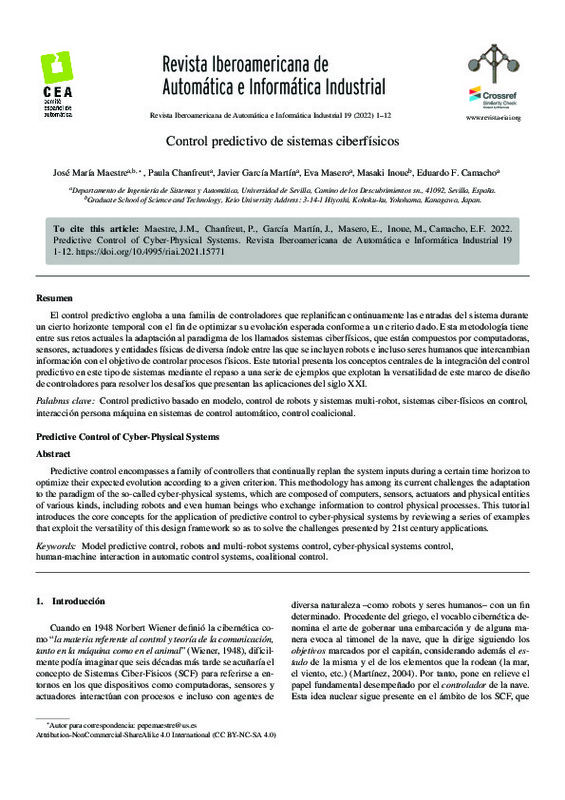JavaScript is disabled for your browser. Some features of this site may not work without it.
Buscar en RiuNet
Listar
Mi cuenta
Estadísticas
Ayuda RiuNet
Admin. UPV
Un esquema de decisiones para intervenciones adaptativas comportamentales de actividad física basado en control predictivo por modelo híbrido: ilustración con Just Walk
Mostrar el registro sencillo del ítem
Ficheros en el ítem
| dc.contributor.author | Cevallos, Daniel
|
es_ES |
| dc.contributor.author | Martín, César A.
|
es_ES |
| dc.contributor.author | El Mistiri, Mohamed
|
es_ES |
| dc.contributor.author | Rivera, Daniel E.
|
es_ES |
| dc.contributor.author | Hekler, Eric
|
es_ES |
| dc.date.accessioned | 2022-10-04T12:52:02Z | |
| dc.date.available | 2022-10-04T12:52:02Z | |
| dc.date.issued | 2022-06-29 | |
| dc.identifier.issn | 1697-7912 | |
| dc.identifier.uri | http://hdl.handle.net/10251/186933 | |
| dc.description.abstract | [EN] Physical inactivity is a major contributor to morbidity and mortality worldwide. Many current physical activity behavioral interventions have shown limited success addressing the problem from a long-term perspective that includes maintenance. This paper proposes the design of a decision algorithm for a mobile and wireless health (mHealth) adaptive intervention that is based on control engineering concepts. The design process relies on a behavioral dynamical model based on Social Cognitive Theory (SCT), with a controller formulation based on hybrid model predictive control (HMPC) being used to implement the decision scheme. The discrete and logical features of HMPC coincide naturally with the categorical nature of the intervention components and the logical decisions that are particular to an intervention for physical activity. The intervention incorporates an online controller reconfiguration mode that applies changes in the penalty weights to accomplish the transition between the behavioral initiation and maintenance training stages. Controller performance is illustrated using an ARX model estimated from system identification data of a representative participant for Just Walk, a physical activity intervention designed on the basis of control systems principles. | es_ES |
| dc.description.abstract | [ES] La inactividad física es uno de los principales factores que contribuyen a la morbilidad y la mortalidad en todo el mundo. Muchas intervenciones comportamentales de actividad física en la actualidad han mostrado un éxito limitado al abordar el problema desde una perspectiva a largo plazo que incluye el mantenimiento. Este artículo propone el diseño de un algoritmo de decisión para una intervención adaptativa de salud móvil e inalámbrica (mHealth) que se basa en conceptos de ingeniería de control. El proceso de diseño se basa en un modelo dinámico que representa el comportamiento basada en la Teoría Cognitiva Social (TCS), con una formulación de controlador fundamentada en el control predictivo por modelo híbrido (HMPC por sus siglas en inglés) la cual se utiliza para implementar el esquema de decisión. Las características discretas y lógicas del HMPC coinciden naturalmente con la naturaleza categórica de los componentes de la intervención y las decisiones lógicas que son propias de una intervención para actividad física. La intervención incorpora un modo de reconfiguración del controlador en línea que aplica cambios en los pesos de penalización para lograr la transición entre las etapas de entrenamiento de iniciación comportamental y mantenimiento. Resultados de simulación se presentan para ilustrar el desempeño del controlador utilizando un modelo ARX estimado de datos de un participante representativo de Just Walk, una intervención de actividad física diseñada usando principios de sistemas de control. | es_ES |
| dc.description.sponsorship | El apoyo para este trabajo ha sido proporcionado por la Fundación Nacional de Ciencias (NSF por sus siglas en inglés) a través de la subvención IIS-449751, y el Instituto Nacional de la Salud (NIH por sus siglas en inglés) a través de la subvención R01CA244777. | es_ES |
| dc.language | Español | es_ES |
| dc.publisher | Universitat Politècnica de València | es_ES |
| dc.relation.ispartof | Revista Iberoamericana de Automática e Informática industrial | es_ES |
| dc.rights | Reconocimiento - No comercial - Compartir igual (by-nc-sa) | es_ES |
| dc.subject | Model predictive control of hybrid systems | es_ES |
| dc.subject | Control of physiological and clinical variables | es_ES |
| dc.subject | System identification | es_ES |
| dc.subject | Control predictivo híbrido | es_ES |
| dc.subject | Control automático de variables fisiológicas y clínicas | es_ES |
| dc.subject | Identificación de sistemas y estimación de parámetros | es_ES |
| dc.title | Un esquema de decisiones para intervenciones adaptativas comportamentales de actividad física basado en control predictivo por modelo híbrido: ilustración con Just Walk | es_ES |
| dc.title.alternative | A decision framework for an adaptive behavioral intervention for physical activity using hybrid model predictive control: illustration with Just Walk | es_ES |
| dc.type | Artículo | es_ES |
| dc.identifier.doi | 10.4995/riai.2022.16798 | |
| dc.relation.projectID | info:eu-repo/grantAgreement/NSF//IIS-449751 | es_ES |
| dc.relation.projectID | info:eu-repo/grantAgreement/NIH//R01CA244777 | es_ES |
| dc.rights.accessRights | Abierto | es_ES |
| dc.description.bibliographicCitation | Cevallos, D.; Martín, CA.; El Mistiri, M.; Rivera, DE.; Hekler, E. (2022). Un esquema de decisiones para intervenciones adaptativas comportamentales de actividad física basado en control predictivo por modelo híbrido: ilustración con Just Walk. Revista Iberoamericana de Automática e Informática industrial. 19(3):297-308. https://doi.org/10.4995/riai.2022.16798 | es_ES |
| dc.description.accrualMethod | OJS | es_ES |
| dc.relation.publisherversion | https://doi.org/10.4995/riai.2022.16798 | es_ES |
| dc.description.upvformatpinicio | 297 | es_ES |
| dc.description.upvformatpfin | 308 | es_ES |
| dc.type.version | info:eu-repo/semantics/publishedVersion | es_ES |
| dc.description.volume | 19 | es_ES |
| dc.description.issue | 3 | es_ES |
| dc.identifier.eissn | 1697-7920 | |
| dc.relation.pasarela | OJS\16798 | es_ES |
| dc.contributor.funder | National Science Foundation, EEUU | es_ES |
| dc.contributor.funder | National Institutes of Health, EEUU | es_ES |
| dc.description.references | Adams, M. A., Sallis, J. F., Norman, G. J., Hovell, M. F., Hekler, E. B., Perata, E., 2013. An adaptive physical activity intervention for overweight adults: A randomized controlled trial. PloS one 8 (12), e82901. https://doi.org/10.1371/journal.pone.0082901 | es_ES |
| dc.description.references | Bandura, A., 1986. Social Foundations of Thought and Action: A Social Cognitive Theory. Prentice-Hall series in social learning theory. | es_ES |
| dc.description.references | Carver, C. S., Scheier, M. F., 1998. On the Self Regulation of Behavior. Cambridge University Press. https://doi.org/10.1017/CBO9781139174794 | es_ES |
| dc.description.references | Chen, T., Ohlsson, H., Goodwin, G. C., Ljung, L., 2011. Kernel selection in linear system identification part ii: A classical perspective. In: 2011 50th IEEE Conference on Decision and Control and European Control Conference. IEEE, pp. 4326-4331. https://doi.org/10.1109/CDC.2011.6160722 | es_ES |
| dc.description.references | Clague, J., Bernstein, L., 2012. Physical activity and cancer. Current Oncology Reports 14 (6), 550-558. https://doi.org/10.1007/s11912-012-0265-5 | es_ES |
| dc.description.references | Deshpande, S., Nandola, N. N., Rivera, D. E., Younger, J. W., 2014. Optimized treatment of fibromyalgia using system identification and hybrid model predictive control. Control Engineering Practice 33 (1), 161-173. https://doi.org/10.1016/j.conengprac.2014.09.011 | es_ES |
| dc.description.references | Dong, Y., Deshpande, S., Rivera, D. E., Downs, D. S., Savage, J. S., 2014. Hybrid model predictive control for sequential decision policies in adaptive behavioral interventions. In: Proc. ACC. pp. 4198-4203. https://doi.org/10.1109/ACC.2014.6859462 | es_ES |
| dc.description.references | El Mistiri, M., Rivera, D. E., Klasnja, P., Park, J., Hekler, E. B., 2022. Model predictive control strategies for optimized mhealth interventions for physical activity. In: 2022 American Control Conference (ACC). submitted. | es_ES |
| dc.description.references | Ferster, C. B., 1970. Schedules of reinforcement with Skinner. In: Dews, P. B. (Ed.), Festschrift for B. F. Skinner. Century psychology series. New York, Appleton-Century-Crofts, pp. 37-46. | es_ES |
| dc.description.references | Freigoun, M. T., Mart ́ın, C. A., Magann, A. B., Rivera, D. E., Phatak, S. S., Korinek, E. V., Hekler, E. B., 2017. System identification of just walk: A behavioral mhealth intervention for promoting physical activity. In: 2017 American Control Conference (ACC). pp. 116-121. https://doi.org/10.23919/ACC.2017.7962940 | es_ES |
| dc.description.references | Guillaume, P., Schoukens, J., Pintelon, R., Kollar, I., 1991. Crest-factor minimization using nonlinear Chebyshev approximation methods. IEEE Transactions on Instrumentation and Measurement 40 (6), 982-989. https://doi.org/10.1109/19.119778 | es_ES |
| dc.description.references | Hekler, E., 2015. Just Walk Study. http://justwalkstudy.weebly.com/, [Online; accessed September-23-2015]. | es_ES |
| dc.description.references | Hekler, E., Rivera, D. E., 2021. Optimizing individualized and adaptive mhealth interventions via control systems engineering methods, R01CA244777: National Institute of Health, National Cancer Institute. | es_ES |
| dc.description.references | Hekler, E. B., Rivera, D. E., Martin, C. A., Phatak, S. S., Freigoun, M. T., Korinek, E., Klasnja, P., Adams, M. A., Buman, M. P., 2018. Tutorial for using control systems engineering to optimize adaptive mobile health interventions. Journal of medical Internet research 20 (6), e8622. https://doi.org/10.2196/jmir.8622 | es_ES |
| dc.description.references | Kha, R., Rivera, D. E., Klasjna, P., Hekler, E., 2022. Model personalization in behavioral interventions using Model-on-Demand estimation and discrete simultaneous perturbation stochastic approximation. In: 2022 American Control Conference (ACC). p. submitted. | es_ES |
| dc.description.references | King, A. C., Hekler, E. B., Grieco, L. A., Winter, S. J., Sheats, J.L., Buman, M. P., Banerjee, B., Robinson, T. N., Cirimele, J., 2013. Harnessing different motivational frames via mobile phones to promote daily physical activity and reduce sedentary behavior in aging adults. PLoS ONE 8 (4), e62613. https://doi.org/10.1371/journal.pone.0062613 | es_ES |
| dc.description.references | Korinek, E. V., Phatak, S. S., Martin, C. A., Freigoun, M. T., Rivera, D. E., Adams, M. A., Klasnja, P., Buman, M. P., Hekler, E. B., 2018. Adaptive step goals and rewards: a longitudinal growth model of daily steps for a smartphone-based walking intervention. Journal of behavioral medicine 41 (1), 74-86. https://doi.org/10.1007/s10865-017-9878-3 | es_ES |
| dc.description.references | Ljung, L., Mar 1994. From Data to Model: A Guided Tour. In: International IEE Conference on Control. Warwick, England, pp. 422-430. https://doi.org/10.1049/cp:19940169 | es_ES |
| dc.description.references | Ljung, L., 1999. System Identification: Theory for the User, 2nd Edition. Upper Saddle River, NJ: Prentice Hall PTR. | es_ES |
| dc.description.references | Ljung, L., Singh, R., Chen, T., 2015. Regularization features in the system identification toolbox. IFAC-PapersOnLine 48 (28), 745-750, 17th IFAC Symposium on System Identification SYSID 2015. https://doi.org/10.1016/j.ifacol.2015.12.219 | es_ES |
| dc.description.references | Martín, C. A., 2016. A system identification and control engineering approachfor optimizing mhealth behavioral interventions based on social cognitivetheory. Ph.D. thesis, Electrical Engineering, Arizona State University | es_ES |
| dc.description.references | Martín, C. A., Deshpande, S., Hekler, E. B., Rivera, D. E., 2015a. A system identification approach for improving behavioral interventions based on Social Cognitive Theory. In: Proc. ACC. pp. 5878-5883. https://doi.org/10.1109/ACC.2015.7172261 | es_ES |
| dc.description.references | Martín, C. A., Rivera, D. E., Hekler, E. B., 2015b. Design of informative identification experiments for behavioral interventions. In: Proceedings of the 17th IFAC Symposium on System Identification. pp. 1325-1330. https://doi.org/10.1016/j.ifacol.2015.12.315 | es_ES |
| dc.description.references | Martín, C. A., Rivera, D. E., Hekler, E. B., 2015c. An identification test monitoring procedure for MIMO systems based on statistical uncertainty estimation. In: Proc. 54th IEEE CDC. pp. 2719-2724. https://doi.org/10.1109/CDC.2015.7402627 | es_ES |
| dc.description.references | Martín, C. A., Rivera, D. E., Hekler, E. B., 2016. A decision framework for an adaptive behavioral intervention for physical activity using hybrid model predictive control. In: Proceedings of the American Control Conference. pp. 3576-3581. https://doi.org/10.1109/ACC.2016.7525468 | es_ES |
| dc.description.references | Martín, C. A., Rivera, D. E., Hekler, E. B., Riley, W. T., Buman, M. P., Adams, M. A., Magann, A. B., 2020. Development of a control-oriented model of Social Cognitive Theory for optimized mHealth behavioral interventions. IEEE Transactions on Control Systems Technology 28 (2), 331-346. https://doi.org/10.1109/TCST.2018.2873538 | es_ES |
| dc.description.references | McGinnis, J. M., Williams-Russo, P., Knickman, J. R., 2002. The case for more active policy attention to health promotion. Health Affairs 21 (2), 78-93. https://doi.org/10.1377/hlthaff.21.2.78 | es_ES |
| dc.description.references | Morari, M., Zafiriou, E., 1989. Robust Process Control. Prentice-Hall International. | es_ES |
| dc.description.references | Nandola, N. N., Rivera, D. E., 2013. An improved formulation of hybrid model predictive control with application to production-inventory systems. IEEE Trans. on Control Systems Technology 21 (1), 121-135. https://doi.org/10.1109/TCST.2011.2177525 | es_ES |
| dc.description.references | Navarro-Barrientos, J. E., Rivera, D. E., Collins, L. M., 2011. A dynamical model for describing behavioural interventions for weight loss and body composition change. Mathematical and Computer Modelling of Dynamical Systems 17 (2), 183-203. https://doi.org/10.1080/13873954.2010.520409 | es_ES |
| dc.description.references | Payne, H. E., Lister, C., West, J. H., Bernhardt, J. M., 2015. Behavioral functionality of mobile apps in health interventions: A systematic review of the literature. JMIR mHealth and uHealth 3 (1), e20. https://doi.org/10.2196/mhealth.3335 | es_ES |
| dc.description.references | Phatak, S. S., Freigoun, M. T., Martín, C. A., Rivera, D. E., Korinek, E. V., Adams, M. A., Buman, M. P., Klasnja, P., Hekler, E. B., 2018. Modeling individual differences: A case study of the application of system identification for personalizing a physical activity intervention. Journal of Biomedical Informatics 79, 82-97. https://doi.org/10.1016/j.jbi.2018.01.010 | es_ES |
| dc.description.references | Pillonetto, G., Dinuzzo, F., Chen, T., De Nicolao, G., Ljung, L., 2014. Kernel methods in system identification, machine learning and function estimation: A survey. Automatica 50 (3), 657-682. https://doi.org/10.1016/j.automatica.2014.01.001 | es_ES |
| dc.description.references | Rivera, D. E., Lee, H., Mittelmann, H. D., Braun, M. W., 2009. Constrained multisine input signals for plant-friendly identification of chemical process systems. Journal of Process Control 19 (4), 623-635. https://doi.org/10.1016/j.jprocont.2008.08.006 | es_ES |
| dc.description.references | Shiffman, S., Stone, A. A., Hufford, M. R., 2008. Ecological momentary assessment. Clinical Psychology 4 (1), 1-32. https://doi.org/10.1146/annurev.clinpsy.3.022806.091415 | es_ES |
| dc.description.references | Timms, K. P., Rivera, D. E., Collins, L. M., Piper, M. E., 2014a. Continuous-time system identification of a smoking cessation intervention,. International Journal of Control 87 (7), 1423-1437. https://doi.org/10.1080/00207179.2013.874080 | es_ES |
| dc.description.references | Timms, K. P., Rivera, D. E., Piper, M. E., Collins, L. M., 2014b. A hybrid model predictive control strategy for optimizing a smoking cessation intervention. In: Proc. ACC. pp. 2389 - 2394. https://doi.org/10.1109/ACC.2014.6859466 | es_ES |











